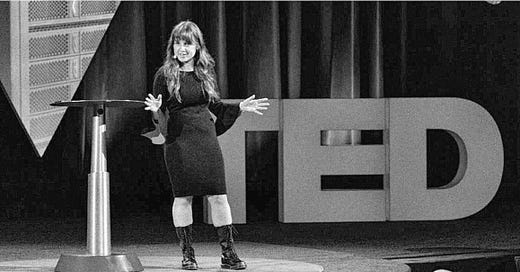Unmasking the New York Times’ Zeynep Tufekci
Neither scholar nor journalist, a media influencer cuts down competitors in an academic knife fight.
4 minute read
Parading across social media with her latest New York Times headline, Columbia University professor Zeynep Tufekci announced to a planet weary of pandemic advice that she had single-handedly solved one of the world’s knottier public health questions: can masks stop COVID transmission? Since we’re talking about an essay in the New York Times, the answer was as effortless and clear as it was predetermined: “Here’s Why the Science Is Clear That Masks Work.”
Having settled the science, Tufekci lamented that the public had been misled about masks once again, this time because commentators misinterpreted a Cochrane review—often referred to as gold standard evidence in medicine—that found no evidence that masks stop community transmission. Tufekci then demonized the Cochrane review’s lead author Tom Jefferson for getting the science wrong, and provided readers with her own scientific review that found masks, well, work.
Cochrane reviews are hard stuff. Thank goodness for the New York Times. Or…?
In reality, Cochrane found no evidence that masks work, then put out a clarification which Tufekci seized upon to claim masks do work, exciting mask advocates to tweet false allegations that Cochrane had printed an “apology.”
Interested in the Columbia professor’s scientific credentials, I dug through her publications and found one lone study on masks that Tufekci co-authored in a peer reviewed journal. That study argued, “We recommend that public officials and governments strongly encourage the use of widespread face masks in public, including the use of appropriate regulation.” Tufekci’s conclusions run counter to Cochrane’s, but when you read her paper, it discloses that it is only a “narrative review” meaning it did not meet Cochrane criteria for inclusion in their analysis.
I then emailed Cochrane’s editor in chief, Karla Soares-Weiser to ask if the New York Times columnist had disclosed to Cochrane her scientific rivalry. “When Tufekci contacted you, did she explain that she had published a review that was in direct competition with the Cochrane systematic review?”
I also asked Soares-Weiser if a column in the Times carries the same weight as a Cochrane review. Since 2006, Cochrane has examined masks and other physical interventions multiple times and has never found high quality evidence of any substantial effect of masks on the spread of respiratory viruses.
But Soares-Weiser did not respond to repeated queries.
I then emailed similar questions to Lisa Bero, Cochrane’s guru on scientific integrity. Bero has studied conflicts of interest for decades, but Bero also did not respond.
Digging a little more, I discovered that Tufekci began promoting herself as a mask expert, long before she had co-authored this single paper in 2021. As the New York Times reported, a March 2020 Tufekci tweetstorm followed by a Tufekci New York Times essay convinced the Centers for Disease Control and Prevention (CDC) to alter federal guidance and advise all Americans above the age of 2 to wear masks.
You don’t need an advanced degree in epidemiology to be alarmed that the CDC sets pandemic policy because of tweets and a Times essay, but Tufekci also tweeted that she promoted masks in two meetings with the World Health Organization.
Neither scholar nor journalist, Tufekci ignores academic rigor by posing as professor and then peer reviewing research in her own Times’ essays. She then flouts journalistic ethics by failing to report facts that don’t fit her academic opinion.
Over several paragraphs, Tufekci points to one of the 12 Cochrane review authors as the apparent culprit for why commentators misinterpreted Cochrane—naming him six times. But Jefferson’s name appears nowhere in Cochrane’s recent statement, and the organization has made clear that editor in chief Karla Soares-Weiser has taken responsibility.
“You may have seen the New York Times article relating to this proposed amendment,” wrote a Cochrane official in an email to their authors, adding that Tufekci had “blindsided” them. “On behalf of Cochrane, Karla has taken responsibility for the loose wording. This is made clear in our full statement, which we have decided to publish on Cochrane.org in light of its partial inclusion in the NYT coverage.”
If Cochrane has made clear that Karla Soares-Weiser was taking responsibility, then why did Tufekci need to drag one of the 12 authors in her essay?
I sent this very question to Tufekci at her New York Times email: “If Cochrane has explained that Dr. Soares-Weiser takes responsibility, why did you name Tom Jefferson so many times? Is there something personal?”
I also asked Tufekci if she had submitted comments to Cochrane like other researchers, and I asked her to clarify if she had disclosed to Cochrane officials that she had published a competing review that drew opposite conclusions.
Tufekci did not respond.
I also contacted the New York Times opinion page to get comment. One editor told me that my questions had been sent to the appropriate editors.
The following day, I contacted the New York Times editors again, “Is that it? When I wrote for the New York Times opinion section, I had to go through a separate fact checking process. Does that not happen for columnists? I'm confused.”
Aren’t we all?






In response to critiques of her column, she did what most people would do when given feedback - blocked and labeled dissenters as "antivaxxers".
Then pivoted to claiming she was always opposed to toddlers masking, except of course when it comes to kindergartners and younger "even if they mask improperly".
https://twitter.com/MichaelDAmbro17/status/1635640791799414792
Im happy i smelled her bull$&it and ego EARLY on. Thank you for laying her out for all to see. 🙏🏻🇨🇦